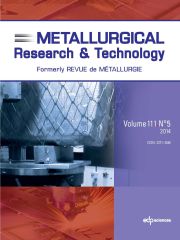Article contents
Application of Modeling to the Developmentof an Electrochemical Pilot Cell
Published online by Cambridge University Press: 09 October 2009
Abstract
The hydrodynamics in an electrolysis pilot-cell has beenmodelled with the aim of upscaling the direct iron productionprocess based on the alkaline electrolysis of an iron oxidesuspension. Two dispersed phase flow involved in this threephaseprocess have been evaluated: the solid and the gasphase hydrodynamics.The suspension flow characteristics areevaluated from existing litterature, and available correlationsare applied to the case under study. The minimum velocityrequired for transportation of finely ground iron oxide alongthe cathode surface is fairly low, in the laminar regime,corresponding to minimum pressure drop.The behaviour ofthe oxygen phase produced on the anode is evaluated in attwo scales. First, the trajectory of a single bubble sliding onthe anode is depicted, predicting possible rising or draggingof the bubbles as a function of its diameter. The gas-phasepattern is then studied from litterature results for gas-liquidflow in pipes. A separation of the gas phase from the liquidis predicted, the lightest phase being in contact with theupper part of the cell. Obtained results confirm the potentialof the selected design for transportation of particles and gasrecovery with low energy consumption.
- Type
- Research Article
- Information
- Metallurgical Research & Technology , Volume 106 , Issue 10: Selected papers from 4th ULCOS SEMINAR (Part 2) , October 2009 , pp. 440 - 454
- Copyright
- © La Revue de Métallurgie, 2009
- 2
- Cited by


